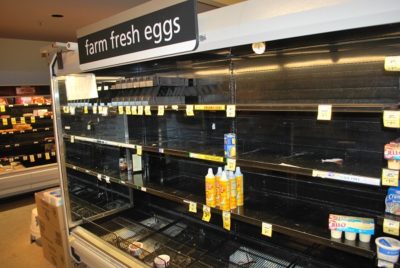 Cyber warfare is one of the top five concerns for the insurance industry, according to a new Towers Watson survey of insurance executives around the world who consider attacks on essential computers among the extreme risks they worry about which could rattle the world to its core.
Cyber warfare is one of the top five concerns for the insurance industry, according to a new Towers Watson survey of insurance executives around the world who consider attacks on essential computers among the extreme risks they worry about which could rattle the world to its core.
The insurance industry is also significantly concerned about a global pandemic and natural disasters, the Towers Watson review revealed. Apparently, insurance industry executives and the self-reliance community have a lot in common.
Here is their Top 10:
- Pandemic: “A new, highly infectious and fatal disease spreads through human, animal or plant populations worldwide.”
- Natural disaster: “A confluence of major earthquakes, tsunamis, hurricanes, flooding and/or volcanic eruptions with major global effects.”
- Food/water/energy crisis: “A major shortfall in the supply of, or access to, food/water/energy, causing severe societal issues.”
- Cyber-warfare: “Computer sabotage/espionage on a major scale, with severe damage to infrastructure, financial, medical or defense systems.”
- Technology: “A large quantity of personal, government or business data stored in clouds are found to be hacked, compromised or misused.”
- Depression: “A deep and protracted trough in economic output, massive increase in unemployment, restriction of credit and shrinking investment.”
- Banking crisis: “Central banks unable/unwilling to supply liquidity in the next crisis, causing banking and real economic activity to stop.”
- An extreme event that causes “property damage, supply-chain failures, business interruption and death on a significant scale.”
- Rise in extreme weather: “Events exceed the capacity of insurance industry and governments to respond, with physical and social implications.”
- Sovereign default: “Nonpayment by a major sovereign borrower causes market panic and disrupts the global economy.”
Everything You Need To Know To Keep Your Home And Family Safe.
Towers Watson Senior Risk Consultant Stephen Lowe said:
Much as we would have expected pandemics and natural catastrophes to figure prominently in insurers’ extreme risk thinking, the high rankings of concerns such as cyber-warfare and a major data compromise in the cloud [user-submitted idea] illustrate how the industry is keeping up to date with risk assessment. The kinds of risks that could wipe out an insurance business do inevitably evolve over time, so we were very encouraged to see this degree of engagement for ma broad sample of the industry.
Although not specifically noted, a downed power grid would most definitely fall within the category of a cyber attack. A cyber attack on the power grid would halt the food supply, leaving millions of Americans in the darkness and extremely vulnerable. As previously reported by Off The Grid News, a successful attack on the power grid would effectively crush the economy, and the loss of life due to a lack of medical services and civil unrest would be monumental.
Former Department of Homeland Security Secretary Janet Napolitano said that a cyber attack on the power grid was a matter of “if” not “when.” She said:
Our country will, at some point, face a major cyber event that will have a serious effect on our lives, our economy and the everyday functioning of our society. While we have built systems, protections and a framework to identify attacks and intrusions, share information with the private sector and across government, and develop plans and capabilities to mitigate the damage, more must be done, and quickly.
National Geographic’s American Blackout movie and the still-in-development Lights Out Saga offer an eerily accurate portrait of what life would be like in the United States if the power grid failed. In the movie, panic took hold of the bulk of the population quickly, and citizens who had become extremely reliant on modern conveniences did not possess the skills, supplies or mindset necessary for long-term survival.
More than 30,000 surveys were completed for the Towers Watson report.
 Off The Grid News Better Ideas For Off The Grid Living
Off The Grid News Better Ideas For Off The Grid Living



